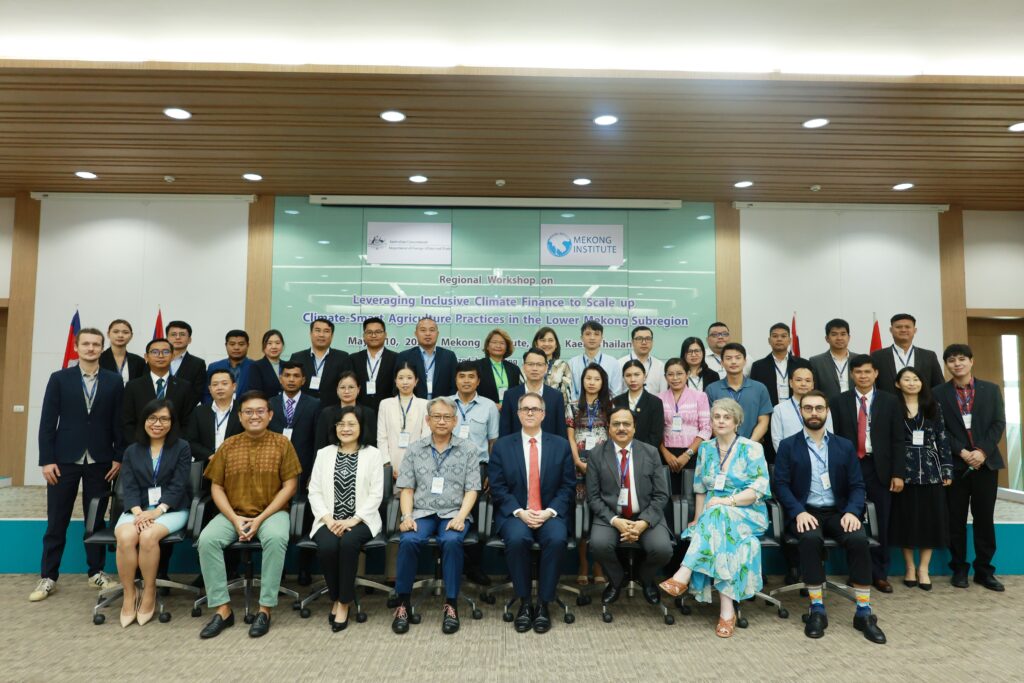Khon Kaen, Thailand — Mekong Institute (MI), in collaboration with Australia’s Department of Foreign Affairs and Trade (DFAT), successfully convened the Regional Workshop on Leveraging Inclusive Climate Finance* to Scale Up Climate-Smart Agriculture Practices in the Lower Mekong Subregion from May 8–10, 2024. Hosted at the MI Regional Training Center, the workshop aimed to enhance the resilience of agricultural value chains in the subregion.
This workshop was the fourth in a series of capacity-building activities under MI’s ongoing project, “Promoting Climate-Smart Agriculture Technologies and Innovations in Lower Mekong Countries.” The workshop was built upon national consultations held in Cambodia, Lao PDR, Viet Nam, and Thailand last October 2023 and two regional trainings this year. The varying levels of awareness across the four countries highlighted the need for comprehensive discussions to build a shared understanding of climate financing in agriculture.
With the overarching goals of facilitating access to climate finance sources, ensuring the availability of suitable, context-specific climate-smart agricultural approaches, building technical capacity, and fostering increased collaboration among key stakeholders, the workshop provided a platform for knowledge-sharing and stakeholder discussions. It catered to officials from line ministries, international agencies, civil society organizations, representatives from financial service providers, and academic experts.
Mr. Suriyan Vichitlekarn, MI Executive Director, addressed the participants underscoring the significance of accessing climate finance to ensure the sustainability of agricultural operations in the region. He explained the importance of partnerships and knowledge-sharing in scaling up climate-smart agriculture initiatives within the region.
Mr. Shayne McKenna, First Secretary at the Australian Embassy in Bangkok, emphasized the far-reaching impacts of climate change on agriculture, affecting water quality, soil structure, and crop cultivation. These, in effect, disrupt global and regional agricultural value chains. He urged support from all development institutions to scale up climate-smart agriculture and stressed the need for increased investments both public and private.
Various organizations graced the event to share their expertise during the sessions. These included the Climate Finance Network Thailand, the Asia Pacific Rural and Agricultural Credit Association, Swisscontact, the Food and Agriculture Organization of the United Nations, the Global Green Growth Institute, the International Rice Research Institute, the International Union for Conservation of Nature, the Mitr Phol Group, and the USAID Regional Development Mission for Asia. These organizations promote sustainable development, climate resilience, and agricultural innovation in the Lower Mekong Subregion and beyond.
Structured into four main sessions, the workshop delivered clear and actionable insights on the collective progress toward the Paris Agreement goals, focusing on climate-smart agriculture adaptation and sustainable agricultural value chain development. Sessions featured expert keynote speeches, panel discussions, Q&A sessions, facilitated dialogues, and interactive group work.
Participants discussed climate change impacts on food systems, requiring proactive measures to protect agricultural productivity. They highlighted the importance of clear indicators for assessing climate-smart farming and advocated creating a climate finance taxonomy to streamline reporting and align efforts with international standards.
The workshop emphasized that a robust climate finance mechanism is crucial to support resilient agricultural practices, suggesting exploring investment opportunities in green technologies. Delegates proposed using green and climate finance tools like green bonds and blended finance to offer diverse financing options. They identified coherent policy frameworks, effective risk management strategies, and collaborative efforts among stakeholders as crucial for successful climate finance initiatives in the region.
Participants recognized that enhancing climate change focal points is important to improving collaboration, tracking, and reporting of solutions. This will foster synergy in addressing climate finance challenges and advancing climate-smart agriculture practices in the region.
_______________________________________________________________________________________________________
*Climate finance refers to all financial flows addressing the causes and consequences of climate change – UNEP








